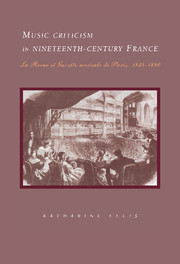Book contents
- Frontmatter
- Contents
- Acknowledgements
- List of abbreviations
- Introduction
- 1 Crosscurrents in early nineteenth-century criticism
- 2 The rise of the specialist press from 1827
- 3 Early music
- 4 The Austro-German tradition I: The reception of Gluck, Haydn and Mozart
- 5 The Austro-German tradition II: The reception of Beethoven
- 6 The Austro-German tradition III: Weber, Schubert and Mendelssohn
- 7 Contemporary music I: Piano music
- 8 Contemporary music II: Chamber and symphonic music
- 9 Contemporary music III: Opera
- 10 Contemporary music IV: The music of the future
- 11 Contemporary music V: Berlioz
- Conclusion
- Appendix 1 Principal contributors to the Gazette
- Appendix 2 Personalia
- Appendix 3 Contes, nouvelles, dialogues and other short literature in Schlesinger's Gazette musicale, 1834–46
- Appendix 4 Publishing history of the Gazette
- Appendix 5 Pseudonyms and attributions
- Bibliography
- Index of musical works cited
- General index
4 - The Austro-German tradition I: The reception of Gluck, Haydn and Mozart
Published online by Cambridge University Press: 22 September 2009
- Frontmatter
- Contents
- Acknowledgements
- List of abbreviations
- Introduction
- 1 Crosscurrents in early nineteenth-century criticism
- 2 The rise of the specialist press from 1827
- 3 Early music
- 4 The Austro-German tradition I: The reception of Gluck, Haydn and Mozart
- 5 The Austro-German tradition II: The reception of Beethoven
- 6 The Austro-German tradition III: Weber, Schubert and Mendelssohn
- 7 Contemporary music I: Piano music
- 8 Contemporary music II: Chamber and symphonic music
- 9 Contemporary music III: Opera
- 10 Contemporary music IV: The music of the future
- 11 Contemporary music V: Berlioz
- Conclusion
- Appendix 1 Principal contributors to the Gazette
- Appendix 2 Personalia
- Appendix 3 Contes, nouvelles, dialogues and other short literature in Schlesinger's Gazette musicale, 1834–46
- Appendix 4 Publishing history of the Gazette
- Appendix 5 Pseudonyms and attributions
- Bibliography
- Index of musical works cited
- General index
Summary
Introduction
Questions of canon lie behind much of the historical and musicological discussion analysed in the previous chapter; however, such questions are more consistently apparent in connection with music from Gluck onwards. In French musical life and criticism, the music of the years around 1780 marks a watershed in the early nineteenth-century perception of a musical canon: Haydn was popularly viewed as the father of modern music, whilst Gluck was the earliest operatic composer acceptable to critics (but not, until the late 1850s, the musical public) for performance on a regular basis. The term ‘canon’ was never used in the Gazette; instead, canonic status was indicated by references to ‘la musique classique’ and ‘les grands maîtres’. In France, traditions in liturgical music and the example of Lully provide exceptions to the general contemporaneity of musical experience in the eighteenth century; however, the formation of a canon centring around the Viennese classics is essentially a product of the nineteenth. This chapter charts and explains the journal's response to music comprising the traditional core of the Austro-German canon (Haydn, Mozart, Beethoven) and its peripheries (including Gluck and Mendelssohn). The Gazette was unusual in its breadth of coverage regarding issues in performance and editorial practice. Most of the writing on these subjects occurred in reviews, and was therefore reactive rather than proactive; its character as a response to contemporary practice illustrates how arguments for authenticity within a continuous tradition arose as a protest against interpretive innovation.
- Type
- Chapter
- Information
- Music Criticism in Nineteenth-Century FranceLa Revue et gazette musicale de Paris 1834–80, pp. 77 - 100Publisher: Cambridge University PressPrint publication year: 1995



